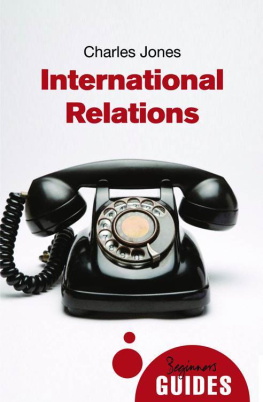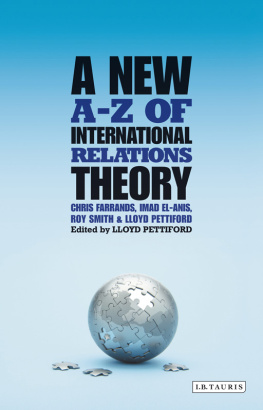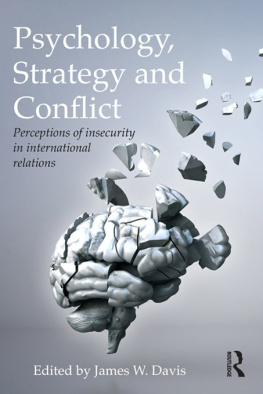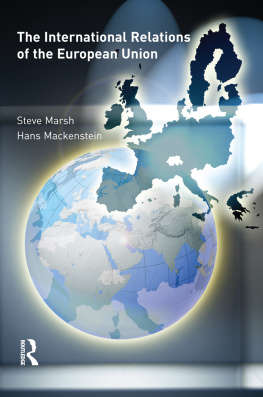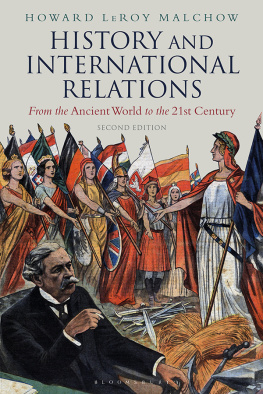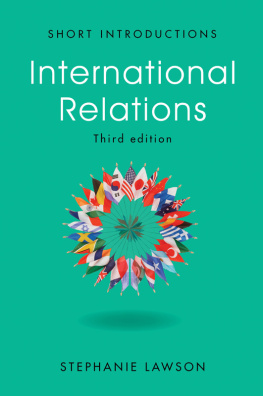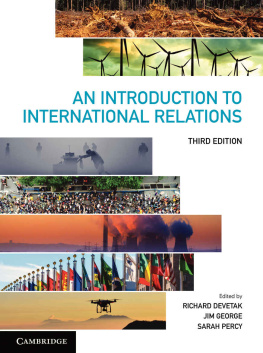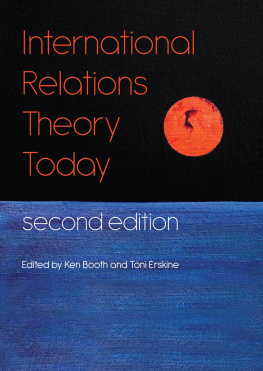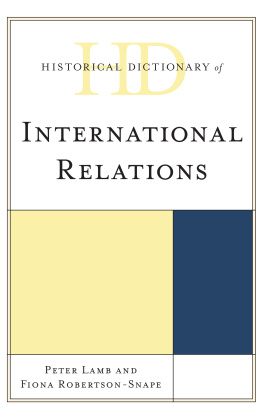
International
Relations
A Beginners Guide
ONEWORLD BEGINNERS GUIDES combine an original, inventive, and engaging approach with expert analysis on subjects ranging from art and history to religion and politics, and everything in-between. Innovative and affordable, books in the series are perfect for anyone curious about the way the world works and the big ideas of our time.



A Oneworld Paperback Original
First published by Oneworld Publications, 2014
Copyright Charles Jones 2014
The moral right of Charles Jones to be identified as the Author of this work has been asserted by him in accordance with the Copyright, Designs and Patents Act 1988
All rights reserved
Copyright under Berne Convention
A CIP record for this title is available
from the British Library
ISBN 978-1-78074-303-5
eISBN 978-1-78074-304-2
Typeset by Siliconchips Services Ltd, UK
Printed and bound in Denmark by
Norhaven A/S
Oneworld Publications
10 Bloomsbury Street
London WC1B 3SR
England
Stay up to date with the latest books, special offers, and exclusive content from Oneworld with our monthly newsletter
Sign up on our website
www.oneworld-publications.com
To Linda Jones
Contents
BISA | British International Studies Association |
BP | British Petroleum (the abbreviated form is now the official title of the firm) |
CoW | Correlates of War |
DC | Developed country |
DRC | Democratic Republic of Congo |
EEZ | Exclusive economic zone |
EU | European Union |
FARC | Fuerzas Armadas de la Revolucin Colombiana |
FDI | Foreign direct investment |
FIFA | Fdration International de Football Association |
G77 | Group of 77 (in UNCTAD and similar bodies) |
GATT | General Agreement on Tariffs and Trade |
GDP | Gross domestic product |
GNP | Gross national product |
HSBC | Hong Kong and Shanghai Banking Corporation (the abbreviated form is now the official title of the firm) |
IFI | International Financial Institution |
IGO | Intergovernmental organization |
IMF | International Monetary Fund |
INGO | International non-governmental organization |
IP | International Politics |
IPCC | Intergovernmental Panel on Climate Change |
IPE | International Political Economy |
IR | International Relations (the academic field) |
ISA | International Studies Association |
ISI | Import substituting industrialization |
LDC | Less developed country |
MID | Militarized Interstate Dispute |
NAFTA | North American Free Trade Agreement |
NATO | North Atlantic Treaty Organization |
NIC | Newly industrializing country |
NGO | Non-governmental organization |
OAPEC | Organization of Arab Petroleum Exporting Countries |
OPEC | Organization of Petroleum Exporting Countries |
TNC | Transnational corporation |
UK | United Kingdom of Great Britain and Northern Ireland |
UN(O) | United Nations (Organization) |
UNCLOS | United Nations Conference on the Law of the Sea |
UNCTAD | United Nations Conference on Trade and Development |
UNGA | United Nations General Assembly |
UNHCR | United Nations High Commission for Refugees |
UNSC | United Nations Security Council |
US(A) | United States (of America) |
USSR | Union of Soviet Socialist Republics (Soviet Union) |
WISC | World International Studies Committee |
WMD | Weapons of mass destruction |
WTO | World Trade Organization |
Note: Unless otherwise indicated, dollars ($) are US dollars,
1 billion = 1,000,000,000 (1 10) and
1 trillion = 1,000,000,000,000 (1 10).
1. The relative frequency of International Relations, International Studies, International Politics, and International Affairs in English, 19402000
2. Ratio of United States merchandise trade to GDP at current prices, 19132006
3. Share of developed countries in world stocks of FDI (%age), 19902010
4. Outward flows of FDI in US $ billions at current prices and exchange rates, and as %age of world total, selected years 19702010
5. Cross-border transactions in bonds and equities as %age of GDP, 19801998
6. The wartime mobilization of women
7. Inter-state wars since 1945
A bland introduction to any field of study without an argument to engage the attention of the reader would be very dull. This book has two.
The first is that International Relations deserves attention precisely because it is not a discipline marked off from other fields by its subject matter or method; nor is it a sub-discipline of political science. I have taken care to provide a basic outline of the growth of the modern states-system and the world economy, the rise of international organizations of every sort, and some principal tendencies in global society. However, social sciences such as economics or politics that begin by abstracting their subject matter from society as a whole in order to apply a distinctive method run a serious risk of losing in relevance what they gain in elegance. The messier, more eclectic approach of International Relations looks not only to history, economics, politics, and law its old companions but beyond them to social anthropology, sociology, and literary and cultural studies. It is perhaps closer in spirit to its purer cousins, contemporary laboratory sciences, where it is commonplace for investigators faced with a new problem to seek new techniques and new kit to tackle it.
The second argument is a call to resist the frequently drawn contrast between political realism and liberal internationalism. This continues to be widely regarded as the principal theoretical division of the field, even though many have challenged it. Realists and liberals are generally said to differ in world view and in their typical policy recommendations. Realists are a pessimistic bunch, at best doubtful about the prospects for international co-operation and progress. Liberals, by contrast, are generally said to be more optimistic (or credulous). Setting aside these differences in temperament, the division is better thought of as a disagreement about the appropriate scope of study. Realists, often identifying themselves with International Politics , opt for a narrow agenda; their critics prefer a broader one.
Next page
